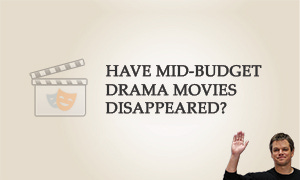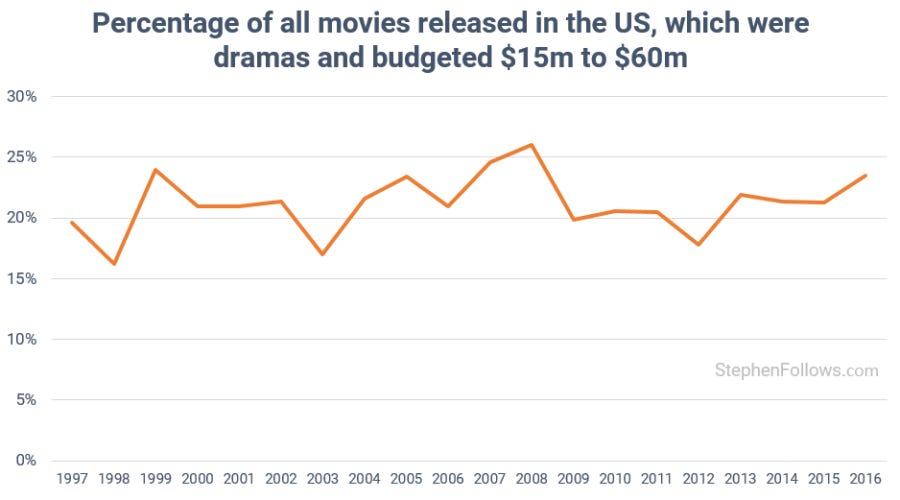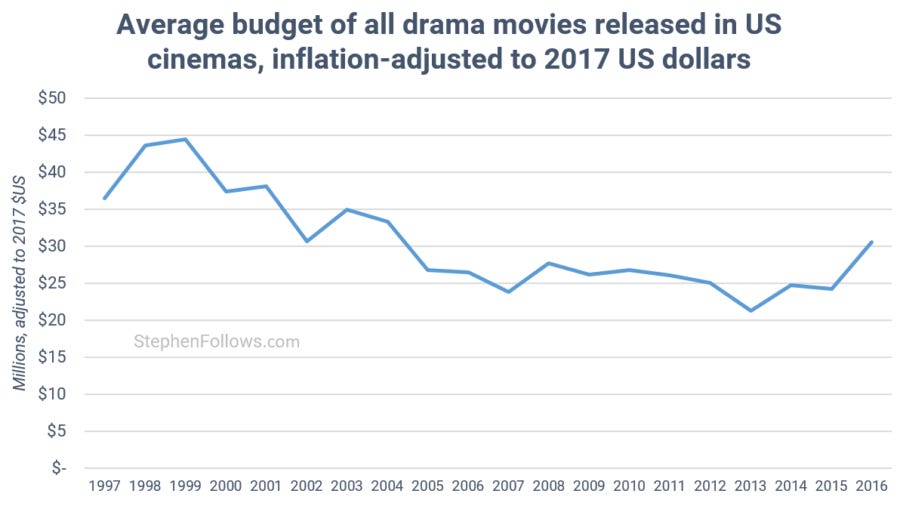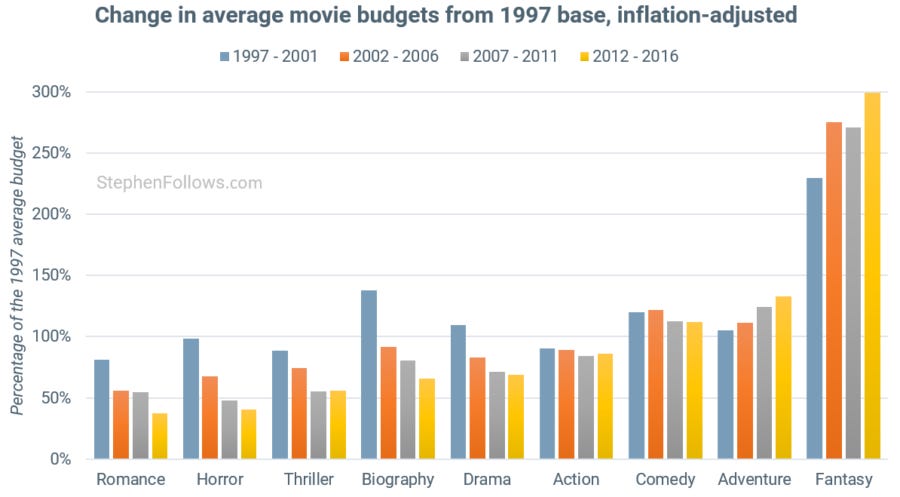Has the mid-budget drama disappeared?

In a recent interview with the Metro newspaper, Matt Damon discussed the changing nature of Hollywood budgets and specifically the decline of mid-budget dramas. Or as the Metro headline put it "Jason Bourne star Matt Damon explains why you’re seeing less indie movies in cinemas".
Let's ignore the journalist's poor grammar and focus on the point Mr Damon was making. His assertion was:
The $15 to $60 million drama, is gone. They just don’t make that movie any more.
It's an interesting claim, so I thought I'd look into the topic.
Have all mid-budget drama movies gone?
Let's start by looking at the data. I built a dataset of all movies which grossed at least one dollar in US cinemas over the past twenty years (1997 to 2016). I then found the IMDb genre classification for each of those movies, along with the production budget, if publicly available.

If these numbers sound high, that's because they are. Both "drama" and "budgeted $15m-$60m" are wide categories and many films get swept up in that net. As I've discussed before, drama is a tricky genre to classify as, strictly speaking, almost everything is drama. IMDb classifies almost 62% of movies over this period as a 'drama' (films can have up to three genres).

Nonetheless, even if we narrow it down to more drama-y dramas (you know - people crying and such) then we still don't see a big shift away from such movies. In 2016 we saw the release of Gold (reportedly costing $30m), Fences ($24m), Collateral Beauty ($36m), The Young Messiah ($18.5m) and Hidden Figures ($25m).
So on the face of it, Matt Damon was wrong. But I think the fault lies not in his fundamental point, but in how he expressed it. If we focus on the budget level, then we see a different picture emerging.
How have drama movie budgets fared over the past twenty years?
Using the same dataset, I looked at the inflation-adjusted average budgets of drama movies over the past twenty years.
The average budget for a drama in 2016 was $30.6 million, 84% of the 1997 figure of $36.5 million. However, if we look at the time series below, we can see that there have been big shifts over this twenty year period, with the 2013 figure ($21.3m) being under half that of 1999 ($44.5m).

It's difficult to tell at this stage if the recent three-year rise will become a longer-term trend.
Have other genres seen budget declines?
Now that we know that drama budgets have broadly fallen, we should look at how this compares with other genres.
Of the nine major genres I studied, drama sat exactly in the middle. Romance movies experienced the biggest decline, with their 2016 average sitting at $23.1m, compared with $52.3m in 1997. Other declining genres were Horror, Thriller and Biography. Fantasy films led the pack in budget growth, although the extreme nature of the effect shown below is in part down to an unusually low average in 1997.

Dissecting Damon's description of diminishing dramas

Overall, I'd tend to agree with Matt Damon that drama feature films are having a harder time than they used to. I don't think it's as stark as he points out, but he's definitely on to something. To end this piece, I thought I'd share more of the original interview, in which he explains the three reasons why he thinks this is happening.
Firstly, he points to how hard it was to get Behind the Candelabra funded:
When we went to do Behind The Candelabra in 2012, we couldn’t get that movie made – and it had Steven Soderberg directing it and me and Michael [Douglas] – and we couldn’t get $23 million to make the movie. And that would have been a lay-up 15 years ago, it would have been five places trying to woo you.
Secondly, he rightly points out that as more of the Hollywood box office is coming from overseas, the studios need to find content which will travel to multiple countries.
You know, because the DVD market dried up. So that severely cut into the margins that studios would rather bet big on these big titles. And with this whole international audience, the more, you know, the simpler the story the more that it can kind of play, the less language matters so that the more broad appeal that it can play around the world, and that’s why you’re seeing the movies change.
Finally, he comments on the effect of SVOD content. As he puts it:
It’s a bummer for me because my bread and butter was those movies, those dramas, but there are lots migrating to TV. Television is really experiencing this renaissance and they’ve got these incredible writers who have so much more power on television than they did in the film world and they’re writing incredible stories.
Notes
The original list of movies was built using The Numbers and IMDb, and I then used IMDb's genre classification. I found budget figures from a variety of public sources including Wikipedia, The Numbers, Box Office Mojo, IMDb and interviews with the filmmakers. Of the original 7,617 movies which were released in US cinemas, I was able to find budget figures for 4,173 (55%).
Epilogue

In an epilogue a few weeks ago, I mentioned that a Liam Neeson production was denied permission to shoot in a Canadian national park and that the park ranger in question should perhaps go into hiding, just in case Mr Neeson is anything like his on-screen persona. It seemed funny at the time but now that I'm including in an article the phrase "Matt Damon was wrong", I find myself wondering if the park ranger has a spare bunk in her secret underground hideout.
At least it's a bit more of a lottery with Matt Damon than Liam Neeson. I could be hunted down and taught valuable lessons about life and maths. Or just have my wallet picked by a ragtag team of tricksters. Or maybe a group of unconvincing dragons and bad Chinese actors will bore me to death? Only time will tell.
To be honest, I'm equally worried about him setting off to find me, getting stranded and causing many people to lose their lives trying to rescue him (à la The Martian, Interstellar, Saving Private Ryan).


